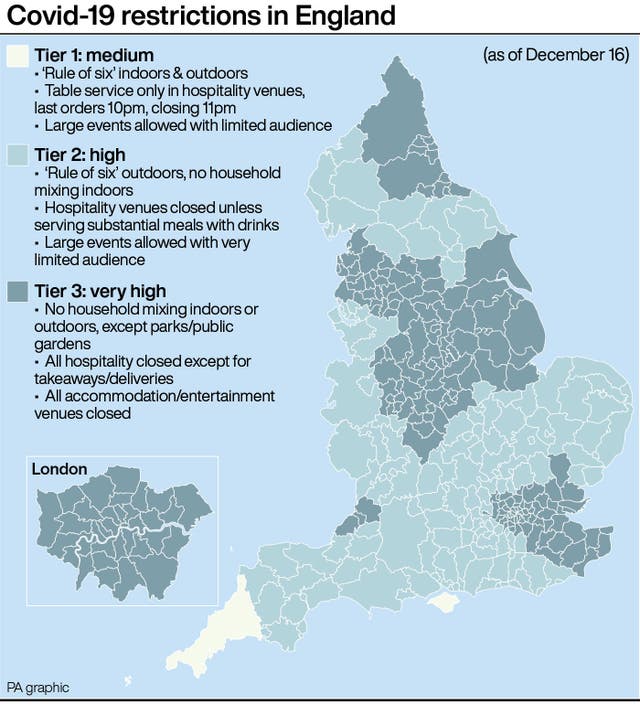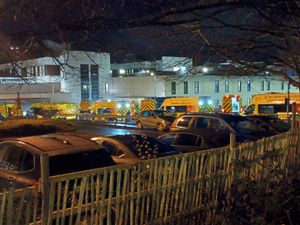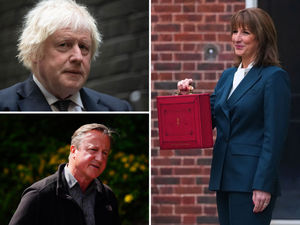Smaller, shorter Christmas celebrations recommended by Johnson
Prime Minister Boris Johnson said people should carefully weigh up the risks before making Christmas plans.
People should “think hard” before meeting family and friends over the festive period, Boris Johnson said as he urged people to have a “merry little Christmas”.
The Prime Minister said a “smaller Christmas is going to be a safer Christmas” and also suggested people should cut short their celebrations rather than enjoy the maximum permitted five days in a festive bubble.
The relaxation of social distancing rules across the UK will go ahead despite concerns about the possible impact on efforts to control the virus.
The original UK-wide plans would have seen three households allowed to form a festive bubble between December 23 and 27.
But Mr Johnson said those were the maximum limits rather than a target to aim for.
It would be “inhuman” to ban Christmas, he added, but there had probably not been similar curbs “since Cromwell’s time”.
He suggested people should reduce their contacts in the five days ahead of the festive period if they were going to mix with friends and relatives.
At a Downing Street press conference, the Prime Minister admitted the coronavirus situation had deteriorated since the festive bubble rules were set by the four nations of the UK.
Mr Johnson said: “While it would not be right, we think, to criminalise people who have made plans and simply want to spend time with their loved ones, we’re collectively – across the UK governments at every level – asking you to think hard, and in detail about the days ahead.”
He said the laws were remaining the same but “a smaller Christmas is going to be a safer Christmas and a shorter Christmas is a safer Christmas”.
People should avoid travelling from areas of high prevalence to regions with lower prevalence and “avoid staying away from home overnight if you can”.
Mr Johnson suggested people should consider waiting until elderly relatives have been vaccinated before meeting them.
He said: “Have yourselves a merry little Christmas – and I’m afraid this year I do mean little.
“But with the vaccine, and all the other measures that we are taking, we do know that things will be better in this country by Easter.”
England’s chief medical officer Professor Chris Whitty suggested it was not worth the risk of meeting the “most vulnerable” until they have been vaccinated.
“We are tantalisingly close to the stage where anybody who gets into trouble as a result of actions this Christmas would have been protected in the very near future,” he said.
“It is very important people think about that when they make decisions over the next few weeks.”
Prof Whitty said his advice for Christmas was: “Keep it small, keep it short, keep it local and think of the most vulnerable people.”
He warned that any extra social contact “leads to an increase in risks and that will lead to an increase in hospitalisations and deaths”.
The new guidance on Christmas came after talks involving the leaders of Scotland, Wales and Northern Ireland and Cabinet Office minister Michael Gove.
Welsh First Minister Mark Drakeford set out his decision to deviate from the previously agreed approach.
He said: “Here in Wales, the position is that only two households should come together to form an exclusive Christmas bubble during the five-day period.
“The fewer people we mix with in our homes, the less chance we have of catching or spreading the virus.”
The price of the relaxed restrictions will be a tougher lockdown in Wales from December 28.
Scotland’s First Minister Nicola Sturgeon recommended that those people forming a Christmas bubble should only meet up on one day and not stay overnight “unless it is unavoidable”.
She said: “Firstly and unequivocally, the safest way to spend Christmas this year for you and for those you love is to stay within your own household and your own home.
“My strong recommendation is this is what you should do if at all possible.”
In Northern Ireland, First Minister Arlene Foster said the public must take “all and every precaution” at Christmas and proposals for further restrictions will be brought forward on Thursday.
Ministers hope that the rollout of a vaccine and improved testing availability will help life return to something closer to normal in the spring.
The first vaccination figures showed almost 138,000 people in the UK have received the jab so far.
The Government has been under intense pressure to scale down Christmas plans because of fears about a surge in cases, particularly given the experience in the US since Thanksgiving in November.
Linda Bauld, professor of public health at the University of Edinburgh, said the easing was a “bad idea” and that people needed to be “incredibly cautious”.
“I think, to avoid the preventable deaths that we’re going to have in January as a result of this, we shouldn’t be doing it, but if we do do it then I think we need to do it in the most modest way possible,” she told BBC Breakfast.

The focus on Christmas arrangements came as around 10.8 million more people began living under England’s toughest restrictions as London and parts of Essex and Hertfordshire moved into Tier 3.
With 61% of England’s population now living under the strictest measures, ministers are due to formally review which tiers are appropriate for each area.
Health Secretary Matt Hancock will set out the new allocations on Thursday.


